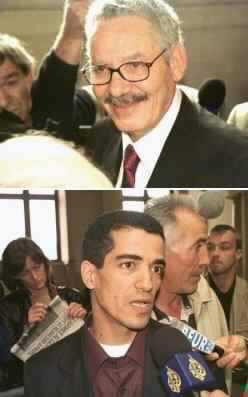HIGHLIGHTS: Nezzar Says Under Obligation to Defend the Honour of the Algerian Army||Weeklong Trial Features Numerous Witnesses Including a Former Algerian Premier||Writer of "The Dirty War" Says Nezzar Played a Pivotal Role in Aborting Second Round of legislative Elections in January 1992, The Islamic Salvation Front Was Set to Win|| STORY: A former Algerian defense minister faced down a one-time special forces officer in a French court on Monday, in a defamation trial that opened a public examination of the conduct of the army during Algeria's brutal Islamic insurgency. (Read photo caption)
"I am here to defend my honor, and I have the moral obligation to defend the honor of the Algerian army," said retired Gen. Khaled Nezzar, widely seen as Algeria's leading decision-maker a decade ago when the insurgency began.
Nezzar, 66, sued former army officer Habib Souaidia, who fled Algeria and became a best-selling author in France, for remarks made during a French television interview in May 2001 in which he accused Algeria's generals, and Nezzar in particular, of being responsible for the violence. Souadia called Nezzar a coward and claimed that he and others have profited from the war that has killed an estimated 120,000 people.
The suit by Nezzar did not concern a book published in France last year by Souaidia, "The Dirty War," which opened a heated debate on the lingering question of whether the army took part in massacres and atrocities as the book claims.
The week-long trial features numerous witnesses, from human rights activists to former Algerian Prime Minister Sid Ahmed Ghozali.
"For the first time, a real trial is taking place about the question of who is killing whom," said Cherifa Khaddar, president of an Algerian victims' group, Our Algeria. She was among numerous Algerians in the packed courtroom. "It's no longer an impersonal question from the media, but real questions by lawyers in a real jurisdiction."
Souaidia, 33, told the court he cited Nezzar because of his crucial role in the army's decision to abort the second round of legislative elections in January 1992 to thwart a likely victory by the Islamic Salvation Front. The now-banned Muslim fundamentalist party won a large first-round victory.
The decision to cancel the North African nation's first multiparty national elections triggered the insurgency by Islamic extremists that continues 10 years later.
Nezzar confirmed he was among a group of officials who decided to cancel the vote, and defended the decision.
"We knew the second round was going to be a sweep (by the fundamentalists), the Afghanization of Algeria," the mustachioed Nezzar told the court.
"We would have used democracy but a single time," he said in a booming voice. If the Islamic Salvation Front had won, "we were going to apply the Sharia," he said, referring to Muslim law.
Once the vote was canceled, Nezzar became a leading figure in a five-man High State Committee that ran the country. Nezzar, who continued to wield power after retirement, claimed that then-President Chadli Bendjedid chose to resign and was not forced from power as is widely believed.
Souaidia, who moved to France last year as a political refugee, said he wrote his book and spoke as he did on television to defend in his own way "what remains of the honor of the national Algerian army."
In the war on Islamic extremists, "a soldier who should apply the law is transformed into a terrorist who tortures and rapes," he told the court.
"One day history will catch up to you," he said in an emotional voice, pointing at Nezzar.
Souaidia spent four years in the military prison on what he claims were unjust charges of theft. Algerian authorities dismiss him as a criminal whose accounts of atrocities amount to inventions.
The radical Armed Islamic Group has claimed responsibility for massacres with hatchets, knives and guns that have killed tens of thousands of civilians, often children, and forced hundreds of thousands of villagers to flee their homes.
However, Souaidia contends security forces systematically tortured and abducted civilians, sometimes indiscriminately, and carried out massacres, too.
He claimed in court that he was present when his special forces burned alive a 15-year-old, tied up and naked, at garbage dump outside Algiers.
"We took him, put him in the dump, put gasoline on him and lit it," he said.
Nezzar himself was the object of a complaint on behalf of three Algerians, two of whom were tortured and one killed. French judicial officials opened an investigation in April 2001 when Nezzar was in Paris to promote his memoirs. But before he could be questioned, Nezzar slipped out of France and returned to Algeria. The case was later dropped.
In the television interview, Souaidia accused Nezzar of acting in a cowardly fashion for leaving town.
Nezzar told the court he left to avoid a diplomatic incident between France and Algeria. He filed the defamation lawsuit the following month.
PHOTO CAPTION
(Top) Former Algerian Defense Minister and retired Gen. Khaled Nezzar smiles as he answers reporters at the Paris courthouse Monday July 1, 2002. Nezzar has sued Habib Souaidia, a former army officer and best-selling author for defamation for linking him to atrocities in Algeria's war on islamic extremists.. (AP Photo/Amel Pain)
(Bottom) Habib Souaidia, (AP Photo/Amel Pain)
- Author:
& News Agencies - Section:
WORLD HEADLINES


 Home
Home Discover Islam
Discover Islam Quran Recitations
Quran Recitations Lectures
Lectures
 Fatwa
Fatwa Articles
Articles Fiqh
Fiqh E-Books
E-Books Boys & Girls
Boys & Girls  Ramadan
Ramadan Fatwa Audios
Fatwa Audios Month of Mercy
Month of Mercy Women
Women Eed Al- Fitr
Eed Al- Fitr Food Recipes
Food Recipes Videos
Videos

 Prayer Times
Prayer Times












